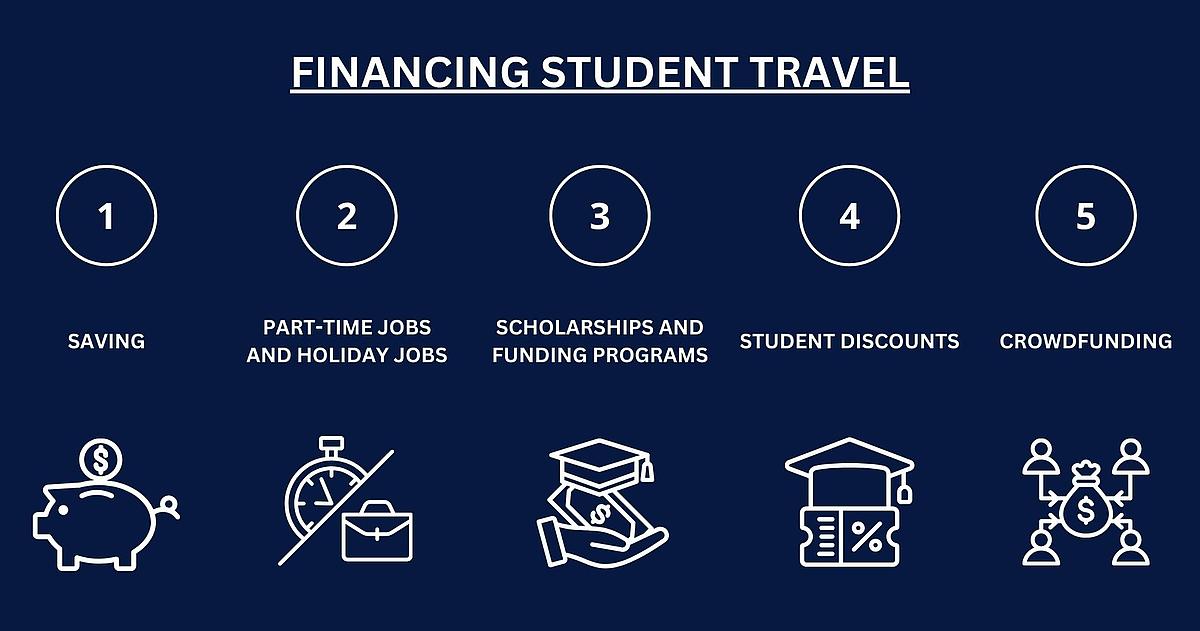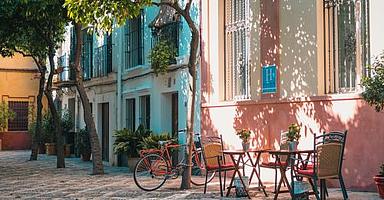This Website uses cookies to improve your visit on our website. More Info
Affordable Travel as a Student ✈ How to experience a lot for little money
As a student, traveling on a budget is not only a great way to discover the world, but also a valuable opportunity to get to know new cultures, broaden your horizons and gain unforgettable experiences – without breaking the bank. Thanks to numerous discounts, clever money-saving tips and flexible travel options, there are many ways to travel affordably and still have an adventure. In this article, we show how students on a budget can reach exciting destinations.
Cheap travel as a Student: The most important feature is flexibility when planning
Cheap travel as a student is characterized above all by one central feature: flexibility when planning. If you remain open about This flexibility makes it possible to take advantage of last-minute deals, special offers or cheap flights and accommodation, allowing the travel budget to be used to best effect.
If you are looking for alternative ways to experience other cultures, then please feel free to take a look at our pages on Semester Abroad, Internship Abroad, Language Trips, Studying Abroad and the more general overview page on Staying Abroad.
To the Overview Page of the Topics covered in the GuideHow to afford traveling as a Student: Financing student travel
To be able to afford traveling as a student, you need clever financing and budget planning. With a smart combination of these options, you can afford traveling as a student financially and set out on unforgettable adventures even with a limited budget.
Overview: Financing Student Travel
These are some common ways to make travel possible, as an overview graphic:

Explanation: Financing Student Travel
Here you will find the most common ways to travel, explained in more detail and with tips:
Saving
The key is to start saving early and consistently. Small savings in everyday life, such as going out less often or avoiding unnecessary expenses, will help you build a solid travel budget over time.
Part-time Jobs and Holiday Jobs
Many students work alongside their studies or during the semester break to earn some extra money. Particularly flexible jobs such as waiting tables, tutoring or working in the events industry are a good way to supplement your travel budget.
Scholarships and Funding Programs
There are numerous scholarships and programs that specifically support travel for students, be it for study trips, internships abroad or cultural exchange programs. It is worth looking for suitable funding opportunities here.
Student Discounts
Many airlines, hostels and public transportation companies offer special discounts for students. By taking advantage of these offers, you can save a considerable amount of money.
Crowdfunding
Crowdfunding can also be an option for special travel projects, such as volunteering or charitable projects. Friends, family or supporters can help finance your trip.
If you are looking for tips on financing your studies, then please feel free to take a look at our pages on Study Scholarships, Student Loans and Working while Studying and the more general overview page on Study Funding.
To the Overview Page of the GuideTips & Tricks for traveling
on a budget as a student

Tips and tricks for traveling on a budget as a student
| Book early or take advantage of last-minute offers | Early booking discounts often secure the best prices for flights and accommodation. |
|---|---|
| Alternatively, last-minute offers on travel platforms such as Skyscanner or Booking.com provide spontaneous and affordable travel options. | |
| Take advantage of flexible travel times | Traveling outside of peak season, during the week or at less popular times can be significantly cheaper. This applies to both flights and accommodation. |
| Take your student ID with you | Many attractions, museums, transportation providers and restaurants offer discounts to students. An International Student Identity Card (ISIC card) can provide additional discounts worldwide. |
| Cheap transportation | Take advantage of long-distance buses (e.g. FlixBus), carpooling (e.g. BlaBlaCar) or Interrail passes for cheap train travel. |
| When it comes to city trips, bicycles or public transportation are often the cheapest options for getting around. | |
| Plan your food budget | You can drastically reduce the cost of meals by cooking for yourself (e.g. in hostels or Airbnb accommodation). Local supermarkets and markets offer affordable ingredients. |
| Eating well on a budget can be done at street food stalls or by ordering lunch menus at restaurants, which are often cheaper than dinner. | |
| Explore free activities | Free walking tours, public parks, beaches and free museums are a great way to save money while experiencing a lot. |
| Couchsurfing meetups and local events offer free social and cultural experiences. | |
| Use travel apps | Apps like Skyscanner, Hopper (for flight bookings), Hostelworld (for accommodation) and Rome2Rio (for transportation options) help you find the best prices and routes. |
| Google Maps and Maps.me are ideal for offline navigation and for finding places of interest. | |
| Pack light | Less baggage often means lower airfare, especially with budget airlines. A carry-on bag or backpack is often enough to avoid unnecessary checked baggage fees. |
| Travel insurance | Although it's an added expense, affordable travel insurance can save a lot of money in an emergency and provides protection in the event of unforeseen events such as illness or flight cancellations. |
| Save money on currency exchange | Avoid high fees when withdrawing money from ATMs abroad by using a free credit card that doesn't charge foreign transaction fees. Also, avoid exchanging money at airports or tourist areas. |
| Find travel companions | Traveling in groups or with friends can significantly reduce costs by sharing expenses for accommodation, transportation, and meals. |
| Spontaneity and open-mindedness | Being open to spontaneous experiences and traveling off the beaten track can not only save you money, but also lead to unique and authentic experiences. |
| Use incognito mode | With frequent searches, cookies quickly pick up on your intentions and can cause trips to become more expensive due to the apparent high level of interest. Incognito mode can help to avoid this. |
Holidays for students without package tours
Holidays for students without package tours offer the freedom to design the trip individually and save costs. Instead of relying on expensive all-inclusive offers, students can travel more flexibly by planning their own trip. Flights, accommodation and activities are booked separately, often through low-cost platforms or with student discounts. Alternative accommodation options such as hostels, couchsurfing or holiday apartments offer further opportunities to save money. It also allows you to make spontaneous decisions and enjoy local, authentic experiences off the beaten track. This way, your vacation is not only cheaper, but also more personal and adventurous.

Transportation
When it comes to affordable transportation options for low-cost travel as a student, there are a number of options that make traveling affordable:
- Flight: Low-cost airlines such as Ryanair, EasyJet or Wizz Air often offer cheap tickets, especially if you are flexible about your travel dates and departure times. Platforms like Skyscanner or Google Flights can be used to compare the best prices. In addition, some airlines offer special student discounts.
- Bus: Long-distance buses are one of the cheapest ways to travel. Companies such as FlixBus, BlaBlaBus or Eurolines offer connections between many European cities at affordable prices. Night trips can help to save on accommodation costs.
- Train: With special offers such as the Interrail Pass, students can travel cheaply across Europe. National rail companies also often offer student discounts or reduced-fare tickets, especially if tickets are booked early.
- Car: car-sharing services like BlaBlaCar make it possible to travel with others and share the cost of petrol. Renting a car or taking a road trip with friends and sharing the costs can also be a flexible and affordable option.
By cleverly combining these means of transport, students can travel cheaply and flexibly without a package holiday.
Length of Stay
One of the biggest advantages of non-package student travel is the flexibility it offers students regarding the length of their stay. This flexibility not only allows students to travel more affordably, but also to tailor their trips to their personal needs and budgets. Here are some of the ways that flexibility in the length of stay can contribute to an affordable and enjoyable travel experience:
| Advantage | Explanation |
|---|---|
| Adaptation to budget and time | Students can flexibly adapt the length of their trips to their budget and schedule. Instead of adhering to a fixed duration as with package tours, they can stay as long as their financial resources allow – be it for a weekend or several weeks. |
| Take advantage of low-cost travel times | Since students are often able to travel outside the peak season, they can respond spontaneously to favorable offers. The flexibility of traveling during the week or in the off-season often results in significant savings on accommodation and transportation costs. |
| Spontaneous changes of plans | Without being tied to fixed bookings, students can change their travel plans at short notice if they find a cheaper place or want to extend their trip. This is especially useful for taking advantage of last-minute deals or unexpected transportation opportunities. |
| Long-term stays and work and travel | For students who want to stay longer in one place, there is the option of long-term stays. These include opportunities such as work and travel, volunteering or internships abroad, where the cost of living can be covered by working or other activities. |
| Combine travel and study breaks | Flexible travel allows students to combine their travels with study breaks, whether it's to study for exams or take online lectures. This way, they can take longer trips without neglecting their studies. |
| Slow Travel | If you have the time, you can take advantage of “slow travel” – traveling slowly with longer stays in individual places. This often saves money, as you can negotiate cheaper accommodation prices for longer stays, and you have the opportunity to explore a destination more intensively. |
Destinations
For students looking for a low-cost vacation without package tours, there are numerous destinations that are not only budget-friendly but also exciting and diverse. Here are some of the best options:
Eastern Europe
Countries such as Poland, Hungary, the Czech Republic and Romania offer not only historic cities but also a low cost of living. Cities such as Krakow, Budapest and Prague are particularly popular with students because they offer affordable accommodation, inexpensive food and many attractions.

Baltic States
Estonia, Latvia and Lithuania not only offer a fascinating mix of nature and historic cities, but also affordable prices for accommodation and activities. Cities like Tallinn or Riga are less crowded but culturally exciting.

Portugal
Outside of the tourist centers, Portugal offers affordable prices for food, accommodation and activities. Cities like Porto or the coastal regions of the Algarve are ideal destinations for a relaxed but inexpensive experience.

The Balkans
Countries such as Croatia, Montenegro, Albania and Serbia are ideal for students who want to combine a beach vacation with cultural experiences. Prices are significantly lower than in Western European destinations, and there are many breathtaking landscapes and coastal towns to discover.

Southeast Asia
Countries such as Thailand, Vietnam, Cambodia or Indonesia are known for their low travel costs. Although the flight there may be more expensive, the cost of living locally is extremely low, making Southeast Asia an ideal destination for students on a budget.

Spain
Away from major cities like Barcelona and Madrid, Spain offers many more affordable destinations. The Andalusia region, with cities like Granada and Seville, attracts visitors with affordable prices and cultural richness. The Canary Islands are often surprisingly inexpensive, especially in the low season.

These destinations offer students the opportunity to experience a lot without breaking the bank. In particular, flexible planning and the choice of affordable transportation make these destinations easy on the wallet.
If you are looking for alternative ways to experience other cultures, then please feel free to take a look at our pages on Semester Abroad, Internship Abroad, Language Trips, Studying Abroad and the more general overview page on Staying Abroad.
To the Overview Page of the GuideAccommodation
For students traveling on a budget, there are a variety of affordable accommodation options. These different accommodation options offer students the flexibility to find cheap and often unique overnight experiences that go easy on the travel budget while providing authentic insights into the respective destination. Here are some options:
| Option | Explanation |
|---|---|
| Hostels | Hostels are one of the most popular and affordable accommodation options for young travelers. They offer dormitory rooms and sometimes private rooms at low prices. Hostels often have a sociable atmosphere, perfect for students who want to meet other travelers. Platforms such as Hostelworld or Booking.com help you find the best deals. |
| Couchsurfing | Couchsurfing allows you to stay with locals for free, on their couch or in a spare room. It's not only a super-cheap option, but also offers you the opportunity to immerse yourself in the local culture and get insider tips. The Couchsurfing.com platform is the best-known point of contact. |
| Airbnb | Airbnb offers a wide range of accommodation, from private rooms to entire apartments. By sharing a place with others, costs can be significantly reduced. Airbnb is often a cheaper alternative to hotels, especially for longer stays. |
| Budget Hotels | There are affordable hotel chains such as Ibis Budget or B&B Hotels that offer simple, clean accommodation at moderate prices. These are more expensive than hostels, but can be an option for students who want a little more privacy. |
| Camping | For outdoor enthusiasts, camping is an affordable way to stay overnight. Many European destinations offer campsites that are a low-cost alternative to hostels or hotels. If you don't have a tent with you, you can also use glamping or rental campers in some regions, which can also be affordable. |
| Housesitting | Housesitting is another interesting option that allows you to stay in houses or flats for free while their owners are traveling. In return, you take care of the house and sometimes pets. Platforms such as TrustedHousesitters help you find such opportunities. |
Activities
For students who prefer to travel without package tours, there are many affordable options for enjoying exciting and unforgettable travel experiences. Here are some tips for inexpensive activities:

Free walking tours
Many cities around the world offer free walking tours, often led by local guides. At the end, you can give the guide a voluntary tip. This is a great way to explore the main attractions and history of a place without spending a lot of money.
Nature and outdoor activities
Hiking, biking, and exploring parks and beaches are often free or very inexpensive. National parks, nature reserves, and public beaches offer the opportunity to experience impressive landscapes without breaking the budget.
Museums and cultural institutions offering discounts
Many museums and attractions offer students discounted admission or even free entry on certain days. In cities like London or Berlin, many museums are accessible free of charge anyway.
Local festivals and events
Festivals, street parties or concerts, which are often free or very cheap, offer the opportunity to immerse yourself in the local culture. Local markets, music or film evenings in the open air are not only inexpensive, but also authentic and entertaining.
Couchsurfing meetups and local meetups
Couchsurfing not only offers free accommodation, but also social events where travelers and locals can meet. Many cities have Couchsurfing meetups or similar platforms that organize free events to help you meet people.
Volunteering and work exchange
If you want to combine travel with a meaningful activity, you can take advantage of volunteering or work exchange programs. Platforms such as Workaway or WWOOF (Willing Workers on Organic Farms) offer the opportunity to work in exchange for free board and lodging while getting to know a new culture.
Student discounts for activities
Many leisure activities such as boat trips, city tours or leisure facilities offer special discounts for students. It is worth taking your student ID with you and asking for discounts.
Self-organized city tours
With the help of apps or travel guides, students can plan their own city tours. Many cities also offer free digital audio guides or apps that help you explore the city on your own.

By taking advantage of such low-cost travel opportunities, students can not only save a lot of money, but also gain authentic and unique experiences that will make their vacation unforgettable.
Meals
For students on a budget, there are numerous affordable options for eating out. These options not only allow you to eat cheaply while traveling, but also to experience the culinary diversity of your destination in an authentic way. Here are some tips on how to eat out on a budget:

- Cooking for yourself: If you are staying in accommodation with a kitchen, such as in hostels, Airbnb apartments or on campsites, cooking for yourself is one of the cheapest options. You can prepare simple dishes such as pasta, rice or sandwiches with fresh ingredients from supermarkets or local markets.
- Street food: Many countries have affordable and delicious street food. You can try local specialties for little money, especially in Southeast Asia, but also in countries like Spain, Italy or Poland. Street food is not only inexpensive, but also offers the opportunity to experience authentic local dishes.
- Food markets: You can often buy fresh fruit, vegetables and other regional products much more cheaply at local markets than in restaurants. What's more, many markets have food stalls selling affordable food. In countries like France or Italy, such markets are particularly popular and well worth a culinary exploration.
- Snacks and cheap restaurants: Many cities have affordable snacks, bakeries and fast food chains that offer cheap meals. Especially in student areas or away from the tourist trail, you can often find inexpensive restaurants that offer local dishes for little money.
- Lunch specials: Many restaurants offer affordable lunch menus, which are often significantly cheaper than the dinner menu. In countries like Spain, the so-called “Menú del día” (daily menu) is an excellent way to eat well and cheaply.
- Supermarkets: Many supermarkets sell prepared snacks, sandwiches or salads that are perfect for a cheap picnic. Frozen products or ready meals are also often a good option if you want to eat something quickly while on the go.
- Fill up your water bottle: Instead of constantly buying water bottles, it's worth bringing a reusable bottle and refilling it at public drinking fountains or in hostels to save money.
Related Study Guide Topics:
Semester Abroad
Internship Abroad
Staying Abroad
Language Trips
Studying Abroad
Study Funding
FAQ
You can find cheap flights on platforms such as Skyscanner, Google Flights or Momondo. For accommodation, sites such as Booking.com, Hostelworld or Airbnb often offer good deals. Last-minute offers on travel portals and flexible bookings directly with bus and train companies such as FlixBus or Deutsche Bahn also help you to book cheap trips.
You can travel very cheaply by being flexible about destinations and times, using cheap means of transport such as buses or carpooling, staying in hostels or using couchsurfing and cooking for yourself as much as possible. Student discounts and free local activities also help to keep costs down.
You can travel cheaply in countries like Poland, Hungary, Romania, Portugal, Thailand, Vietnam or Indonesia, because the cost of living is lower there and you can experience a lot for little money.
In Germany, you can travel cheaply in regions such as Saxon Switzerland, the Harz Mountains, the Eifel or the Mecklenburg Lake District. Cities like Leipzig and Dresden also offer plenty of affordable accommodation and free attractions.
It's best to book last-minute vacations about one to two weeks before departure, as many providers lower their prices during this time to fill any remaining vacancies.
Interested in a study program? Request our information material now!
More exciting degree programs in Munich













